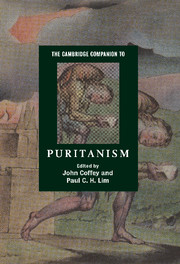Book contents
- Frontmatter
- Introduction
- Part I: English Puritanism
- Part II: Beyond England
- Part III: Major Themes
- 11 Practical divinity and spirituality
- 12 Puritan polemical divinity and doctrinal controversy
- 13 Puritans and the Church of England: historiography and ecclesiology
- 14 Radical Puritanism, c. 1558-1660
- 15 Puritan millenarianism in old and New England
- 16 The godly and popular culture
- 17 Puritanism and gender
- 18 Puritanism and literature
- Part IV: Puritanism and posterity
- Index
16 - The godly and popular culture
from Part III: - Major Themes
Published online by Cambridge University Press: 28 November 2008
- Frontmatter
- Introduction
- Part I: English Puritanism
- Part II: Beyond England
- Part III: Major Themes
- 11 Practical divinity and spirituality
- 12 Puritan polemical divinity and doctrinal controversy
- 13 Puritans and the Church of England: historiography and ecclesiology
- 14 Radical Puritanism, c. 1558-1660
- 15 Puritan millenarianism in old and New England
- 16 The godly and popular culture
- 17 Puritanism and gender
- 18 Puritanism and literature
- Part IV: Puritanism and posterity
- Index
Summary
The task of delineating the relationship between Puritanism and popular culture may be compared with walking into a minefield that contains not merely hidden explosive devices but also treacherous pockets of quicksand. The hapless scholar is simultaneously confronted by two conceptual and definitional hazards. Both the subjects of enquiry are slippery, contentious and intractable; both have been the focus of prolonged and inconclusive debates about their nature, shape and usefulness as analytical tools; both are capable of being dismissed as no more than optical illusions. As discussed elsewhere in this volume, historians have spilt considerable quantities of ink attempting to capture the essence and significance of 'Puritanism'. Likened to a 'protean beast' and 'dragon lurking in the path of every student of the period', to some the term has seemed 'an admirable refuge from clarity of thought' that should be banished permanently from academic discourse. Others uphold its value as a way of characterising the distinctive style of piety practised by a zealous subset of Protestants in the English-speaking world - an affective, evangelical piety rooted in an experimental application of the Calvinist doctrine of predestination and revolving around preaching, prayer and pious reading of the Bible and other godly books. Sometimes combined with a determination to work for further reform of the structures of ecclesiastical government and with discontent about the 'popish' liturgical and ceremonial residues that remained within the church, it characteristically involved strenuous commitment to upholding a strict moral code.
- Type
- Chapter
- Information
- The Cambridge Companion to Puritanism , pp. 277 - 293Publisher: Cambridge University PressPrint publication year: 2008
- 2
- Cited by

